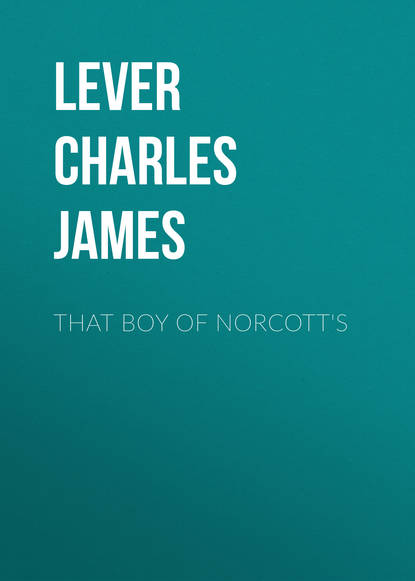 Полная версия
Полная версияThat Boy Of Norcott's
Arrived in London, I was once more a “personage;” at least, to my family solicitors. My father’s will had been already proved, and I was recognized in all form as the heir to his title and fortune. They were eager to know would I restore the family seat at Hexham. The Abbey was an architectural gem that all England was proud of, and I was eagerly entreated not to suffer it to drop into decay and ruin. The representation of the borough – long neglected by my family – only needed an effort to secure; and would I not like the ambition of a parliamentary life?
What glimpses of future greatness were shown me! what possible chances of this or that attained that would link me with real rank forever! And all this time I was pining to clasp my mother to my arms; to pour out my whole heart before her, and tell her that I loved a pale Jewish girl, silent and half sad-looking, but whose low soft voice still echoed within my heart, and whose cold hand had left a thrill after its touch that had never ceased to move me.
“Oh, Digby, my own, own darling,” cried she, as she hugged me in her arms, “what a great tall fellow you have grown, and how like – how like him!” and she burst into a torrent of tears, renewed every time that she raised her eyes to my face, and saw how I resembled my father. There seemed an ecstasy in this grief of which she never wearied, and day after day she would sit holding my hand, gazing wistfully at me, and only turning away as her tearful eyes grew dim with weeping. I will not dwell on the days we passed together; full of sorrow they were, but a sorrow so hallowed by affection that we felt an unspeakable calm shed over us.
My great likeness to my father, as she first saw him, made her mind revert to that period, and she never ceased to talk of that time of hope and happiness. Ever ready to ascribe anything unfavorable in his character to the evil influences of others, she maintained that though occasionally carried away by hot temper and passion, he was not only the soul of honor but had a heart of tenderness and gentleness. Curious to find out what sudden change of mind had led him after years of neglect and forgetfulness to renew his relations with her, by remitting money to her banker, we examined all that we could of his letters and papers to discover a clew to this mystery. Baffled in all our endeavors, we were driven at length to write to the Frankfort banker through whom the letter of credit had come. As we assumed to say that the money should be repaid by us, in this way hoping to trace the history of the incident, we received for answer, that, though bound strictly to secrecy at the time, events had since occurred which in a measure removed that obligation. The advance, he declared, came from the house of Hodnig and Oppovich, Fiume, who having failed since that time, there was no longer the same necessity for reserve. “It is only this morning,” he added, “that we have received news of the death of Herr Ignaz Oppovich, the last of this once opulent firm, now reduced to utter ruin.”
My mother and I gazed on each other in silence as we read these words, when at length she threw her arms around me and said, “Let us go to her, Digby; let us set out this very day.”
Two days after we were on the Rhine. I was seated with my mother on the deck of a river steamer, when I was startled to hear a voice utter my name. The speaker was a burly stout man of middle age, who walked the deck with a companion to whom he talked in a loud tone.
“I tell you, sir,” said he, “that boy of Norcott’s, what between those new coal-fields and the Hexham property, can’t have less than ten thousand a year.”
“And he’s going to marry a rich Austrian Jewess, they say,” replied the other, “as if his own fortune was not enough for him.”
“He’ll marry her, and desert her just as his father did.”
I have but to say that I accomplished one part of this prediction, and hope never to fulfil the other.
THE END


